A
Auto Express
Guest
The Mitsubishi Eclipse Cross is a mid-size family SUV that competes with the Peugeot 3008, SEAT Ateca and Toyota C-HR. It fits into the Mitsubishi range above the ASX and below the Outlander, which the brand says will change accordingly to accommodate this new model. The firm also says the Eclipse Cross marks a change in its direction. This car is the start of a strategy to steal sales from rival companies by building better cars - which sounds like a sensible tactic to us.
To that end the Eclipse Cross comes with a new 1.5-litre petrol engine, available with manual and CVT gearboxes. A hybrid model is also expected to arrive later.
• Best crossovers on sale right now
Manual petrol cars are front-wheel drive only, but automatic versions will be available with four-wheel drive. A system called Super-All Wheel Control (S-AWC) is fitted to these 4x4 versions as well, which controls torque to each wheel, sending power where it’s needed most. A selectable driving mode can change how it responds - there are Auto, Snow and Gravel modes.
There are four trim levels to choose from: entry-level Verve, Design SE, Dynamic and top-of-the-range Exceed. All are well equipped and feature good levels of safety kit.
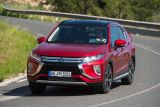
Mitsubishi Eclipse Cross - front cornering
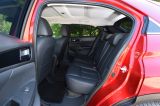
Mitsubishi Eclipse Cross - rear seats

Mitsubishi Eclipse Cross - front
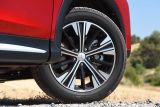
Mitsubishi Eclipse Cross - wheel
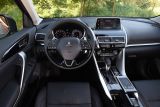
Mitsubishi Eclipse Cross - dash
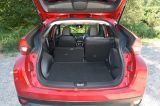
Mitsubishi Eclipse Cross - boot
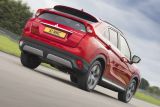
Mitsubishi Eclipse Cross - rear bumper action
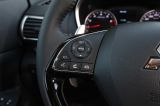
Mitsubishi Eclipse Cross - steering wheel detail
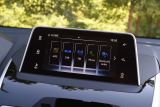
Mitsubishi Eclipse Cross - infotainment screen
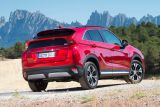
Mitsubishi Eclipse Cross - rear static
Prices start at just over £22,500 and top out at just under £31,000, meaning the Eclipse Cross undercuts the Peugeot 3008, but can't match the entry-level Nissan Qashqai.
The Eclipse Cross name comes from a small sports car called the Mitsubishi Eclipse that was on sale until 2011 in the US, China and some other markets. It’s choice for this SUV is a reference to the sporty styling, while the Cross part refers to the crossover aspirations. It’s based on the same platform as the Outlander, so a future hybrid version is likely to use tech from the popular PHEV version of that car - though it won’t be a plug-in itself.
Mitsubishi has made a genuine step forward with the Eclipse Cross - unlike some of its stablemates, this little SUV feels upmarket inside, is comfortable and feels composed on the road. It’s spacious too, despite the sloping roofline and angular bodywork - the sliding rear seats add versatility that will work well for family buyers.
We’ve only had the chance to try the petrol model so far, which featured a disappointing CVT gearbox that takes away any driving pleasure. It's much better with a manual gearbox, but the petrol’s overall poor economy means it’s tough to recommend over rivals, although if that’s not so much of an issue, the unit itself is refined and punchy enough.
The Eclipse Cross enters an incredibly competitive class, including some fantastic cars such as the Peugeot 3008, SEAT Ateca and Toyota C-HR. So even though the new model is worth a look for anyone in the market for a compact family SUV, it’s only nipping at its rivals’ ankles for now.
Hop into the Mitsubishi Eclipse Cross and you’ll find a relatively high-up driving position, but it’s comfortable enough thanks to the supportive seats and well-placed pedals. Initially the car feels as though it will be a little on the uncomfortable side, as the low-speed ride isn’t as smooth as a Peugeot 3008’s, but once you get going it rides well.
It’s at its best on a motorway or main road, as big potholes tend to thud into the cabin - although it’s no worse than a SEAT Ateca, and the seats help take the edge off things. Opt for a trim with smaller wheels and things are likely to improve, too.
Body control in corners is good, while the reasonably quick and direct steering means it’s actually pretty good to drive on a sweeping road. There’s not much feedback through the wheel, but that’s common to SUVs in this class - and while the Mitsubishi isn’t as good to drive as the 3008 or Ateca, it’s not a long way behind by any means.

Mitsubishi Eclipse Cross - front cornering

Mitsubishi Eclipse Cross - rear seats

Mitsubishi Eclipse Cross - front

Mitsubishi Eclipse Cross - wheel

Mitsubishi Eclipse Cross - dash

Mitsubishi Eclipse Cross - boot

Mitsubishi Eclipse Cross - rear bumper action

Mitsubishi Eclipse Cross - steering wheel detail

Mitsubishi Eclipse Cross - infotainment screen

Mitsubishi Eclipse Cross - rear static
We recommend opting for a manual gearbox if at all possible, as the CVT automatic takes a big toll on the driving experience. If you only ever drive in the city a CVT will probably work well, but put your foot down and the revs soar noisily as the gearbox resists the need for a higher ratio.
The CVT in the Eclipse Cross mimics a normal auto gearbox, but because of that it’s actually the worst of both worlds: it slurs shifts into simulated ‘gears’, while still holding revs unpleasantly high for too long when you want to accelerate. Paddles behind the wheel offer a manual mode of sorts, but it’s incredibly unresponsive and unpleasant to use - even though the paddles themselves are beautifully designed.
Engines
The 1.5-litre turbocharged petrol engine has 161bhp and 250Nm of torque, and it feels punchy enough to take on similar units in rival cars. It’s refined and smooth too, becoming even easier to like when paired with a manual gearbox. 0-62mph takes 10.4 seconds in the four-wheel drive CVT model, and 9.7 seconds in the front-wheel drive version.
Mitsubishi has launched the Eclipse Cross with a new 1.5-litre petrol engine, which isn’t very cheap to run. It’ll manage just 37.7mpg in front-wheel drive cars with a manual gearbox, while the CVT version with 4WD returns 32.5mpg - a significant step behind key rivals.

Mitsubishi Eclipse Cross - front cornering

Mitsubishi Eclipse Cross - rear seats

Mitsubishi Eclipse Cross - front

Mitsubishi Eclipse Cross - wheel

Mitsubishi Eclipse Cross - dash

Mitsubishi Eclipse Cross - boot

Mitsubishi Eclipse Cross - rear bumper action

Mitsubishi Eclipse Cross - steering wheel detail

Mitsubishi Eclipse Cross - infotainment screen

Mitsubishi Eclipse Cross - rear static
CO2 figures of 170g/km (manual) and 185g/km (CVT) are also behind the competition, and will mean higher company car tax bills as well - although new VED rules mean almost all cars in this class will cost £150 a year to tax, after the initial first-year rate charge.
The Eclipse Cross does perform well in terms of residual values. Expert data suggests that Mitsubishi's mid-sized SUV will retain an average of 47.6% of its original value over three years and 36,000 miles.
If it looks familiar, that’s because the exterior design comes from the Mitsubishi XR PHEV II Concept car - and with its sloping roofline and sculpted bodywork the Eclipse Cross has a coupe-SUV look to it, similar to the Toyota C-HR’s distinctive styling.
Mitsubishi’s wide grille and large badge sit at the front of the car, but the nose is dominated by sharp chrome design highlights that move from the headlights inwards, pinching up the lower grille area and accentuating the headlights and foglights. A silver skid plate gives it a hint of off-road feel too, as do the roof bars.
At the side you’ll notice the sloping roofline and rising shoulder line, but unfortunately this moves up towards the rather awkward boot hatch. A split rear windscreen allows the steep roof angle without losing practicality or visibility as a result, but it looks awkward - a shame considering the rest of the car is quite handsome.
On the inside, the Eclipse Cross fares rather better, with its fairly Lexus-like design. The materials used inside are typically Japanese - high-quality but a bit ugly-looking. However they are for the most part soft to the touch, with only a few scratchy plastics lower down. The design mimics the angular outside looks, but it’s much more cohesive - and there are smart-looking, comfortable seats as well.
Sat-nav, stereo and infotainment
A seven-inch touchscreen display comes as standard on the Eclipse Cross, and sits on top of the dash like in a BMW. the screen itself looks smart, and it’s pretty responsive to the touch. There’s a trackpad controller on the centre console, but it’s easier to use the display itself to select the functions you need - and there are heater and air-con controls as physical buttons, unlike in the Peugeot 3008 - an important feature.

Mitsubishi Eclipse Cross - front cornering

Mitsubishi Eclipse Cross - rear seats

Mitsubishi Eclipse Cross - front

Mitsubishi Eclipse Cross - wheel

Mitsubishi Eclipse Cross - dash

Mitsubishi Eclipse Cross - boot

Mitsubishi Eclipse Cross - rear bumper action

Mitsubishi Eclipse Cross - steering wheel detail

Mitsubishi Eclipse Cross - infotainment screen

Mitsubishi Eclipse Cross - rear static
Where the screen loses points is in the fact that there’s no sat-nav included. It supports Apple CarPlay and Android Auto, which some buyers will prefer to an in-car sat-nav anyway, but if you don’t have a compatible phone then you’ll be stuck without navigation - and you’ll have to pay data charges to your phone carrier when you need to get somewhere.
The Eclipse Cross is a five-seater only, although the rear seats can slide back and forth to change between extra legroom and more boot space. The front is spacious enough, with a decent driving position and plenty of storage cubbies within easy reach.
Visibility is good front and rear, although the split rear windscreen means there’s a solid line straight through your main mirror that could get distracting. The side mirrors are nice and big, though, which helps when you’re changing lanes on the motorway.
A braked towing capacity of 1,600kg isn’t bad, but for pulling a caravan or larger trailer you’re better off with a stronger diesel rival.
Size
The new Mitsubishi measures in at 4,405mm long, 1,805mm wide and 1,685mm high, which places it between the ASX and Outlander in the Mitsubishi range. It’s shorter and thinner than a Peugeot 3008, but is a little taller - and it’s longer than a SEAT Ateca too. The SEAT is wider, though, and quite a bit shorter.

Mitsubishi Eclipse Cross - front cornering

Mitsubishi Eclipse Cross - rear seats

Mitsubishi Eclipse Cross - front

Mitsubishi Eclipse Cross - wheel

Mitsubishi Eclipse Cross - dash

Mitsubishi Eclipse Cross - boot

Mitsubishi Eclipse Cross - rear bumper action

Mitsubishi Eclipse Cross - steering wheel detail

Mitsubishi Eclipse Cross - infotainment screen

Mitsubishi Eclipse Cross - rear static
The Eclipse Cross place its driver fairly high up, although getting in and out isn’t a problem - it’s only a small SUV, after all. Its dimensions place it firmly in the compact crossover SUV class, and even without getting the measuring tape out you’d easily be able to tell that it’s about the same size as its rivals.
Leg room, head room & passenger space
A sliding rear seat means that you can easily improve rear legroom - and even with the seats fully forward an adult will just about fit behind a tall driver. Slide the seats back, if you’ve not got much luggage in the boot, and there’s plenty of space in the rear seats. Even with that sloping roofline, headroom is decent back there as well but taller passengers might brush against the roof.
Boot
With the seats all the way back there’s 341 litres of space in the boot, but slide them forward all the way and it opens up to 448 litres. That’s not bad, but a Peugeot 3008 has 520 litres in the back all the time - and it’s still spacious enough in the back seats as well.
The opening is nice and tall, but it could be wider and the sides of the boot aren’t flat. The floor is, though, which is the most important thing - and the seats fold down with no lip. A small loading lip shouldn’t cause too much trouble for big items either.
Mitsubishi has a strong reputation of building reliable, long-lasting cars. The Eclipse Cross didn't feature in our latest Driver Power customer satisfaction survey, but Mitsubishi itself ranked a credible 16th out of 30 manufacturers, ahead of Fiat, Ford and Vauxhall.

Mitsubishi Eclipse Cross - front cornering

Mitsubishi Eclipse Cross - rear seats

Mitsubishi Eclipse Cross - front

Mitsubishi Eclipse Cross - wheel

Mitsubishi Eclipse Cross - dash

Mitsubishi Eclipse Cross - boot

Mitsubishi Eclipse Cross - rear bumper action

Mitsubishi Eclipse Cross - steering wheel detail

Mitsubishi Eclipse Cross - infotainment screen

Mitsubishi Eclipse Cross - rear static
Euro NCAP gave the Eclipse Cross the full five stars for safety, awarding it an excellent 97 per cent adult occupant score. The protection afforded to child occupants was less stellar, but still decent at 78 per cent, while pedestrian safety garnered an 80 per cent score and its safety assist technology prompted a 71 per cent result.
Standard safety tech includes autonomous emergency braking, lane departure warning, seven airbags and auto-dipping headlights. Adaptive cruise control, blind spot assistance and rear cross traffic alert are offered as options, as is a set of cameras allowing a bird’s-eye view of the car when you’re parking.
The adaptive cruise control can go right down to a standstill, which holds the car when you’re in traffic until you press the accelerator pedal, at which point it will move off to match the speed of the car in front automatically.
Warranty
A long warranty is a hint at how reliable the brand expects the car to be, and all Mitsubishis get five-year cover as standard in the UK. That covers the car for up to 62,500 miles as well, and only Toyota, Hyundai and Kia models can match that, as the industry standard is a three-year warranty period. There’s even a 12-year anti-corrosion warranty period.
Servicing
Mitsubishi offers a service plan for its range of cars in the UK, covering the first three services. It says over 90 per cent of owners choose this plan, and while there’s no information on the cost of what will be offered on the Eclipse Cross, it’s likely to be a competitive offer.
Continue reading...
To that end the Eclipse Cross comes with a new 1.5-litre petrol engine, available with manual and CVT gearboxes. A hybrid model is also expected to arrive later.
• Best crossovers on sale right now
Manual petrol cars are front-wheel drive only, but automatic versions will be available with four-wheel drive. A system called Super-All Wheel Control (S-AWC) is fitted to these 4x4 versions as well, which controls torque to each wheel, sending power where it’s needed most. A selectable driving mode can change how it responds - there are Auto, Snow and Gravel modes.
There are four trim levels to choose from: entry-level Verve, Design SE, Dynamic and top-of-the-range Exceed. All are well equipped and feature good levels of safety kit.

Mitsubishi Eclipse Cross - front cornering

Mitsubishi Eclipse Cross - rear seats

Mitsubishi Eclipse Cross - front

Mitsubishi Eclipse Cross - wheel

Mitsubishi Eclipse Cross - dash

Mitsubishi Eclipse Cross - boot

Mitsubishi Eclipse Cross - rear bumper action

Mitsubishi Eclipse Cross - steering wheel detail

Mitsubishi Eclipse Cross - infotainment screen

Mitsubishi Eclipse Cross - rear static
Prices start at just over £22,500 and top out at just under £31,000, meaning the Eclipse Cross undercuts the Peugeot 3008, but can't match the entry-level Nissan Qashqai.
The Eclipse Cross name comes from a small sports car called the Mitsubishi Eclipse that was on sale until 2011 in the US, China and some other markets. It’s choice for this SUV is a reference to the sporty styling, while the Cross part refers to the crossover aspirations. It’s based on the same platform as the Outlander, so a future hybrid version is likely to use tech from the popular PHEV version of that car - though it won’t be a plug-in itself.
Mitsubishi has made a genuine step forward with the Eclipse Cross - unlike some of its stablemates, this little SUV feels upmarket inside, is comfortable and feels composed on the road. It’s spacious too, despite the sloping roofline and angular bodywork - the sliding rear seats add versatility that will work well for family buyers.
We’ve only had the chance to try the petrol model so far, which featured a disappointing CVT gearbox that takes away any driving pleasure. It's much better with a manual gearbox, but the petrol’s overall poor economy means it’s tough to recommend over rivals, although if that’s not so much of an issue, the unit itself is refined and punchy enough.
The Eclipse Cross enters an incredibly competitive class, including some fantastic cars such as the Peugeot 3008, SEAT Ateca and Toyota C-HR. So even though the new model is worth a look for anyone in the market for a compact family SUV, it’s only nipping at its rivals’ ankles for now.
Hop into the Mitsubishi Eclipse Cross and you’ll find a relatively high-up driving position, but it’s comfortable enough thanks to the supportive seats and well-placed pedals. Initially the car feels as though it will be a little on the uncomfortable side, as the low-speed ride isn’t as smooth as a Peugeot 3008’s, but once you get going it rides well.
It’s at its best on a motorway or main road, as big potholes tend to thud into the cabin - although it’s no worse than a SEAT Ateca, and the seats help take the edge off things. Opt for a trim with smaller wheels and things are likely to improve, too.
Body control in corners is good, while the reasonably quick and direct steering means it’s actually pretty good to drive on a sweeping road. There’s not much feedback through the wheel, but that’s common to SUVs in this class - and while the Mitsubishi isn’t as good to drive as the 3008 or Ateca, it’s not a long way behind by any means.

Mitsubishi Eclipse Cross - front cornering

Mitsubishi Eclipse Cross - rear seats

Mitsubishi Eclipse Cross - front

Mitsubishi Eclipse Cross - wheel

Mitsubishi Eclipse Cross - dash

Mitsubishi Eclipse Cross - boot

Mitsubishi Eclipse Cross - rear bumper action

Mitsubishi Eclipse Cross - steering wheel detail

Mitsubishi Eclipse Cross - infotainment screen

Mitsubishi Eclipse Cross - rear static
We recommend opting for a manual gearbox if at all possible, as the CVT automatic takes a big toll on the driving experience. If you only ever drive in the city a CVT will probably work well, but put your foot down and the revs soar noisily as the gearbox resists the need for a higher ratio.
The CVT in the Eclipse Cross mimics a normal auto gearbox, but because of that it’s actually the worst of both worlds: it slurs shifts into simulated ‘gears’, while still holding revs unpleasantly high for too long when you want to accelerate. Paddles behind the wheel offer a manual mode of sorts, but it’s incredibly unresponsive and unpleasant to use - even though the paddles themselves are beautifully designed.
Engines
The 1.5-litre turbocharged petrol engine has 161bhp and 250Nm of torque, and it feels punchy enough to take on similar units in rival cars. It’s refined and smooth too, becoming even easier to like when paired with a manual gearbox. 0-62mph takes 10.4 seconds in the four-wheel drive CVT model, and 9.7 seconds in the front-wheel drive version.
Mitsubishi has launched the Eclipse Cross with a new 1.5-litre petrol engine, which isn’t very cheap to run. It’ll manage just 37.7mpg in front-wheel drive cars with a manual gearbox, while the CVT version with 4WD returns 32.5mpg - a significant step behind key rivals.

Mitsubishi Eclipse Cross - front cornering

Mitsubishi Eclipse Cross - rear seats

Mitsubishi Eclipse Cross - front

Mitsubishi Eclipse Cross - wheel

Mitsubishi Eclipse Cross - dash

Mitsubishi Eclipse Cross - boot

Mitsubishi Eclipse Cross - rear bumper action

Mitsubishi Eclipse Cross - steering wheel detail

Mitsubishi Eclipse Cross - infotainment screen

Mitsubishi Eclipse Cross - rear static
CO2 figures of 170g/km (manual) and 185g/km (CVT) are also behind the competition, and will mean higher company car tax bills as well - although new VED rules mean almost all cars in this class will cost £150 a year to tax, after the initial first-year rate charge.
The Eclipse Cross does perform well in terms of residual values. Expert data suggests that Mitsubishi's mid-sized SUV will retain an average of 47.6% of its original value over three years and 36,000 miles.
If it looks familiar, that’s because the exterior design comes from the Mitsubishi XR PHEV II Concept car - and with its sloping roofline and sculpted bodywork the Eclipse Cross has a coupe-SUV look to it, similar to the Toyota C-HR’s distinctive styling.
Mitsubishi’s wide grille and large badge sit at the front of the car, but the nose is dominated by sharp chrome design highlights that move from the headlights inwards, pinching up the lower grille area and accentuating the headlights and foglights. A silver skid plate gives it a hint of off-road feel too, as do the roof bars.
At the side you’ll notice the sloping roofline and rising shoulder line, but unfortunately this moves up towards the rather awkward boot hatch. A split rear windscreen allows the steep roof angle without losing practicality or visibility as a result, but it looks awkward - a shame considering the rest of the car is quite handsome.
On the inside, the Eclipse Cross fares rather better, with its fairly Lexus-like design. The materials used inside are typically Japanese - high-quality but a bit ugly-looking. However they are for the most part soft to the touch, with only a few scratchy plastics lower down. The design mimics the angular outside looks, but it’s much more cohesive - and there are smart-looking, comfortable seats as well.
Sat-nav, stereo and infotainment
A seven-inch touchscreen display comes as standard on the Eclipse Cross, and sits on top of the dash like in a BMW. the screen itself looks smart, and it’s pretty responsive to the touch. There’s a trackpad controller on the centre console, but it’s easier to use the display itself to select the functions you need - and there are heater and air-con controls as physical buttons, unlike in the Peugeot 3008 - an important feature.

Mitsubishi Eclipse Cross - front cornering

Mitsubishi Eclipse Cross - rear seats

Mitsubishi Eclipse Cross - front

Mitsubishi Eclipse Cross - wheel

Mitsubishi Eclipse Cross - dash

Mitsubishi Eclipse Cross - boot

Mitsubishi Eclipse Cross - rear bumper action

Mitsubishi Eclipse Cross - steering wheel detail

Mitsubishi Eclipse Cross - infotainment screen

Mitsubishi Eclipse Cross - rear static
Where the screen loses points is in the fact that there’s no sat-nav included. It supports Apple CarPlay and Android Auto, which some buyers will prefer to an in-car sat-nav anyway, but if you don’t have a compatible phone then you’ll be stuck without navigation - and you’ll have to pay data charges to your phone carrier when you need to get somewhere.
The Eclipse Cross is a five-seater only, although the rear seats can slide back and forth to change between extra legroom and more boot space. The front is spacious enough, with a decent driving position and plenty of storage cubbies within easy reach.
Visibility is good front and rear, although the split rear windscreen means there’s a solid line straight through your main mirror that could get distracting. The side mirrors are nice and big, though, which helps when you’re changing lanes on the motorway.
A braked towing capacity of 1,600kg isn’t bad, but for pulling a caravan or larger trailer you’re better off with a stronger diesel rival.
Size
The new Mitsubishi measures in at 4,405mm long, 1,805mm wide and 1,685mm high, which places it between the ASX and Outlander in the Mitsubishi range. It’s shorter and thinner than a Peugeot 3008, but is a little taller - and it’s longer than a SEAT Ateca too. The SEAT is wider, though, and quite a bit shorter.

Mitsubishi Eclipse Cross - front cornering

Mitsubishi Eclipse Cross - rear seats

Mitsubishi Eclipse Cross - front

Mitsubishi Eclipse Cross - wheel

Mitsubishi Eclipse Cross - dash

Mitsubishi Eclipse Cross - boot

Mitsubishi Eclipse Cross - rear bumper action

Mitsubishi Eclipse Cross - steering wheel detail

Mitsubishi Eclipse Cross - infotainment screen

Mitsubishi Eclipse Cross - rear static
The Eclipse Cross place its driver fairly high up, although getting in and out isn’t a problem - it’s only a small SUV, after all. Its dimensions place it firmly in the compact crossover SUV class, and even without getting the measuring tape out you’d easily be able to tell that it’s about the same size as its rivals.
Leg room, head room & passenger space
A sliding rear seat means that you can easily improve rear legroom - and even with the seats fully forward an adult will just about fit behind a tall driver. Slide the seats back, if you’ve not got much luggage in the boot, and there’s plenty of space in the rear seats. Even with that sloping roofline, headroom is decent back there as well but taller passengers might brush against the roof.
Boot
With the seats all the way back there’s 341 litres of space in the boot, but slide them forward all the way and it opens up to 448 litres. That’s not bad, but a Peugeot 3008 has 520 litres in the back all the time - and it’s still spacious enough in the back seats as well.
The opening is nice and tall, but it could be wider and the sides of the boot aren’t flat. The floor is, though, which is the most important thing - and the seats fold down with no lip. A small loading lip shouldn’t cause too much trouble for big items either.
Mitsubishi has a strong reputation of building reliable, long-lasting cars. The Eclipse Cross didn't feature in our latest Driver Power customer satisfaction survey, but Mitsubishi itself ranked a credible 16th out of 30 manufacturers, ahead of Fiat, Ford and Vauxhall.

Mitsubishi Eclipse Cross - front cornering

Mitsubishi Eclipse Cross - rear seats

Mitsubishi Eclipse Cross - front

Mitsubishi Eclipse Cross - wheel

Mitsubishi Eclipse Cross - dash

Mitsubishi Eclipse Cross - boot

Mitsubishi Eclipse Cross - rear bumper action

Mitsubishi Eclipse Cross - steering wheel detail

Mitsubishi Eclipse Cross - infotainment screen

Mitsubishi Eclipse Cross - rear static
Euro NCAP gave the Eclipse Cross the full five stars for safety, awarding it an excellent 97 per cent adult occupant score. The protection afforded to child occupants was less stellar, but still decent at 78 per cent, while pedestrian safety garnered an 80 per cent score and its safety assist technology prompted a 71 per cent result.
Standard safety tech includes autonomous emergency braking, lane departure warning, seven airbags and auto-dipping headlights. Adaptive cruise control, blind spot assistance and rear cross traffic alert are offered as options, as is a set of cameras allowing a bird’s-eye view of the car when you’re parking.
The adaptive cruise control can go right down to a standstill, which holds the car when you’re in traffic until you press the accelerator pedal, at which point it will move off to match the speed of the car in front automatically.
Warranty
A long warranty is a hint at how reliable the brand expects the car to be, and all Mitsubishis get five-year cover as standard in the UK. That covers the car for up to 62,500 miles as well, and only Toyota, Hyundai and Kia models can match that, as the industry standard is a three-year warranty period. There’s even a 12-year anti-corrosion warranty period.
Servicing
Mitsubishi offers a service plan for its range of cars in the UK, covering the first three services. It says over 90 per cent of owners choose this plan, and while there’s no information on the cost of what will be offered on the Eclipse Cross, it’s likely to be a competitive offer.
Continue reading...
